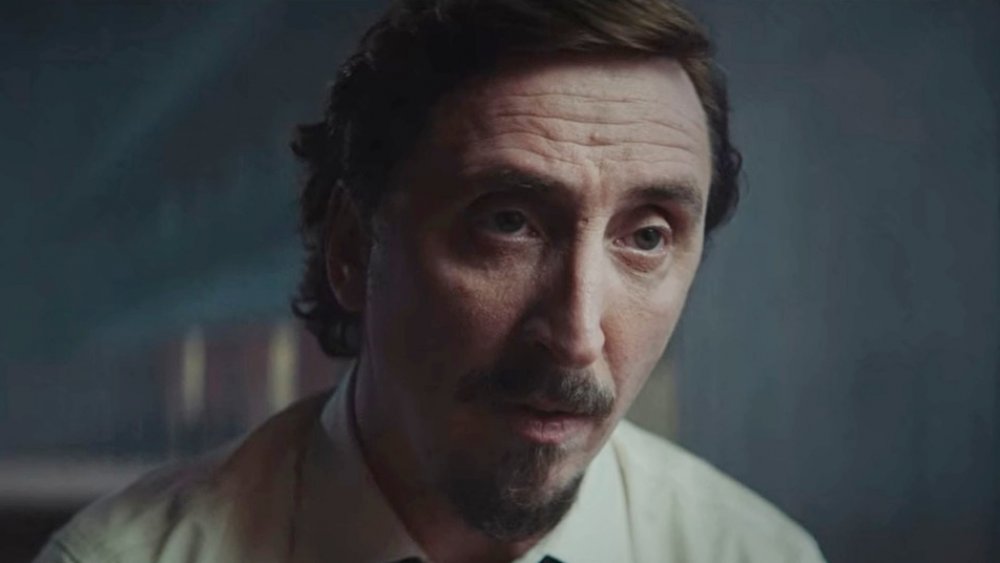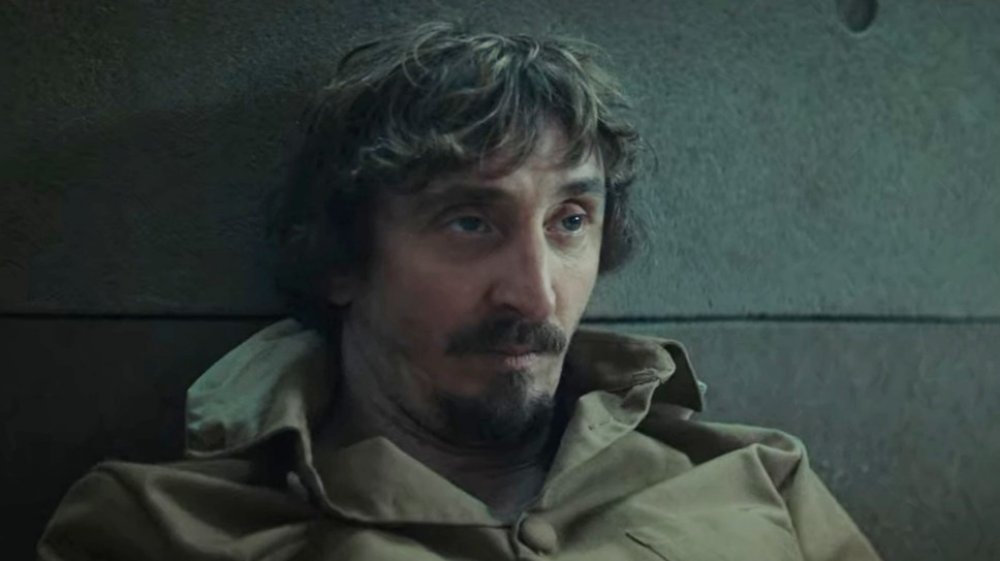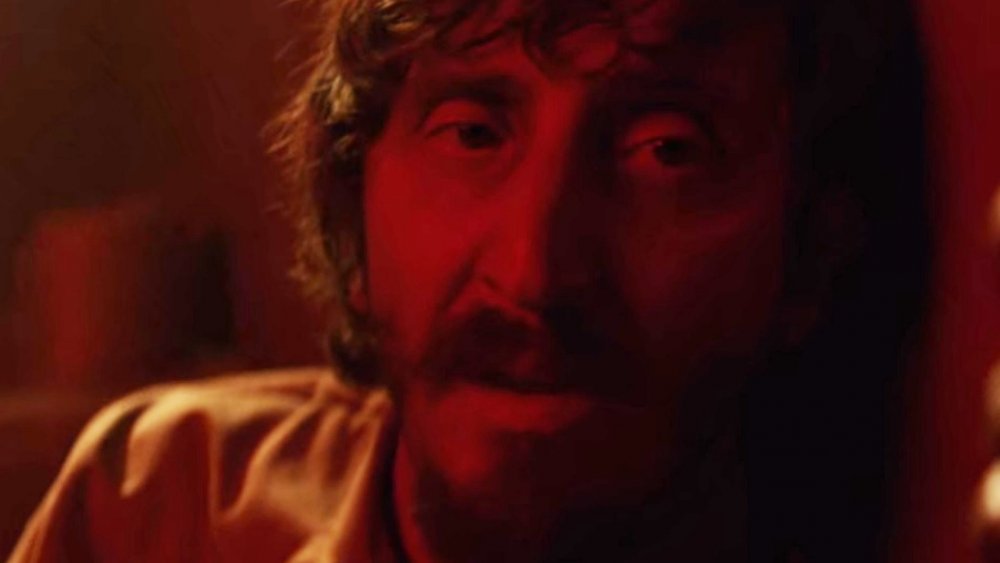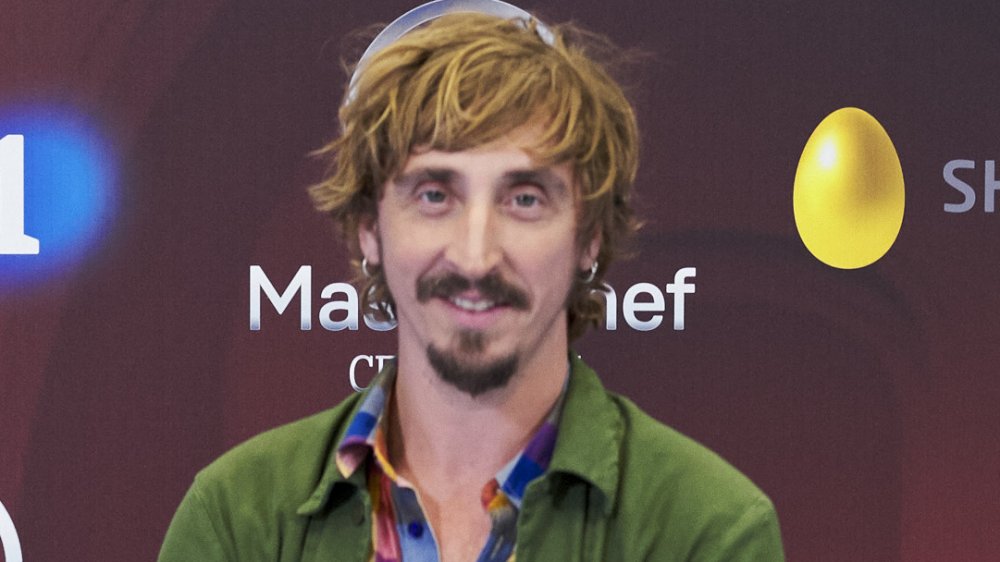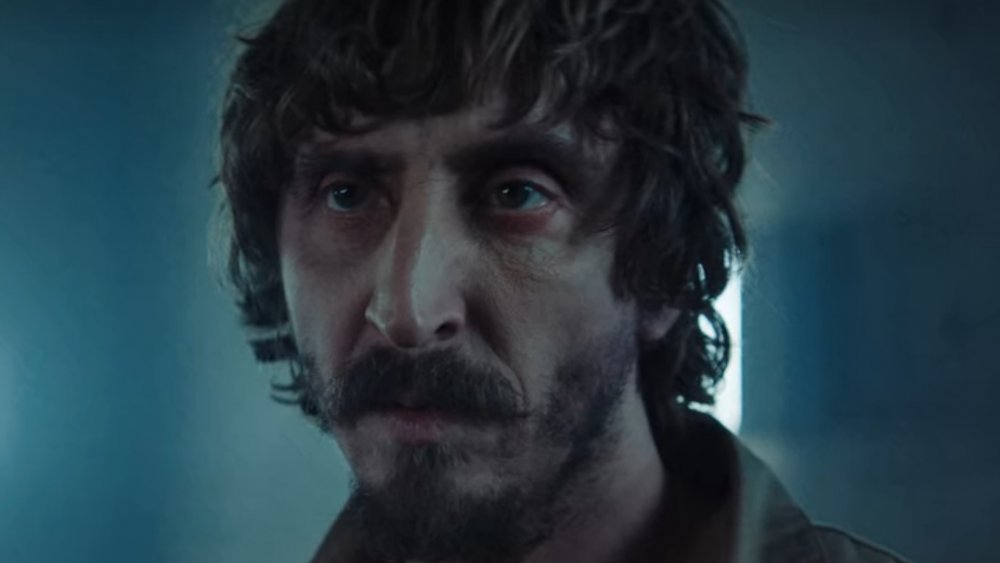The Untold Truth Of Goreng From The Platform
Netflix original movie The Platform shocked viewers when it dropped on the streaming service in March 2020. The Spanish film blends dystopian sci-fi, societal allegory, and strong religious undertones to tell the story of a prison that uses a unique system of punishing its inmates. In this particular prison, called the Vertical Self-Management Center, prisoners are grouped two to a cell, and each day a platform with enough food to feed all of them is lowered through the cells. Each cell gets two minutes to eat as much or as little as they want, with the cells toward the top getting first choice, and the cells at the bottom getting scraps, if anything at all.
Many viewers were left scratching their heads at the ending of The Platform due to the metaphorical nature of the film's conclusion and the questionable fate of its hero, Goreng (Iván Massagué). As the protagonist of The Platform, Goreng is both the main character of the story, and the figure which the messages and themes revolve around. While the larger allegories of the movie might seem a bit obtuse at first, once you begin to pick them out, everything becomes more clear.
That process starts with understanding who Goreng is and what role he's meant to play. Let's dive in and explore everything there is to know about The Platform's number one inmate.
Goreng is both a character and a metaphor
Everyone interred in the prison is there for a particular reason, and Goreng has agreed to endure six months inside with the promise that when he's done, he'll receive a diploma which will qualify him to become a professor. He is both an academic and an idealist, and when he learns about the conditions of the prison, he is horrified to learn that instead of each level carefully rationing out the food, the prisoners gorge themselves without regard for the people below.
His first cellmate is a man named Trimagasi (Zorion Eguileor), who has been in the prison for longer than Goreng and is both greedy and full of contempt for those in the cells below him. Goreng chastises him and attempts to get him to change his ways, but his pleas fall on deaf ears. As Trimagasi has been in the prison for a long time, he has experienced the kind of true desperation that Goreng has not. While Goreng's intentions are clearly noble, he lacks the lived experience to communicate with someone like Trimagasi. In this way, the character serves as an allegory for the follies of idealism.
Later in the movie, Goreng teams up with another inmate to ride down with the platform and attempt to enforce a rationing system through violence. As the film's director, Galder Gaztelu-Urrutia, told Digital Spy, this was a critique of socialism. "There may be a criticism of capitalism from the beginning," he explained, "but we do show that as soon as Goreng and Baharat try out socialism to convince the other prisoners to willingly share their food, they end up killing half of the people they set out to help."
The key to understanding Goreng's fate is his name
Although The Platform is a Spanish language film, viewers will notice that the names of the characters aren't actually Spanish ones. In fitting with the movie's allegorical messages, each character's name has a symbolic meaning, and Goreng is no exception. His name is a Malay word that means "fried." Considering the cold and sterile nature of the world of The Platform, this doesn't make a ton of sense at first... that is, until you consider the film's ending.
While on his mission to try to force the other inmates to ration their food, Goreng ends up descending all the way to the bottom of the prison, which he discovers is level 333. Each level of the prison is meant to have two prisoners on it, which means there are 666 total people in the prison, an obvious allusion to the Christian concept of Hell.
In Christian tradition, Christ not only sacrifices himself by being crucified, but also by descending to the depths of Hell. Goreng does the same as part of his mission to try to end the suffering of those stuck in the prison. Although we don't see him consumed by flames at the end, it's not a stretch to assume that "fried" is both the translation of his name and the fate of his character.
Only one actor could have played Goreng
Although he wasn't well-known stateside before the release of The Platform, actor Iván Massagué has appeared in many films and TV shows in his native Spain. In fact, he was Gaztelu-Urrutia's first choice for the role of Goreng. In a 2019 interview, the director explained his casting process to Backlot Magazine. "At the beginning, when [the] script was almost ready, we thought about Iván Massagué," he said. "The actors were very, very helpful, and were the most important part during the movie, because they completely [loved] the project and they wanted to do their best for it."
One recent appearance that may have helped Massagué prepare for the cutthroat nature of The Platform was as a contestant on a recent season of Spain's MasterChef Celebrity. Massagué lasted for four episodes during the reality cooking competition's third season, which premiered in 2018. Starring in back-to-back productions involving massive amounts of food was probably a pain for the actor, especially considering the extreme diet he had to endure in order to portray Goreng.
Ivan Massague transformed himself physically for The Platform
Throughout the film, which takes place over a number of months, Goreng loses a significant amount of weight as life in the prison takes its toll on his body. His character often rejects food out of principle, and he ends up in several situations where he has little or nothing to eat for an extended period of time. In order to authentically capture his malnutrition, Massagué himself had to lose a significant amount of weight for the role.
Gaztelu-Urrutia explained how they managed to capture Goreng's emaciated look to Filmmaker Magazine. "It was shot chronologically to facilitate the emotional and physical development of the characters," he explained. "Iván appears in practically every shot of the film, and during the shoot, over six weeks, he had to lose 12 kilos [26 pounds] to give credibility to Goreng's physical and psychological deterioration... Imagine how hard it is to act in [a] movie that in itself demands so much of you, while simultaneously following the most severe diet of your life."
We're sure that after his experience playing Goreng, Iván Massagué will never look at a plate of food the same way ever again.
